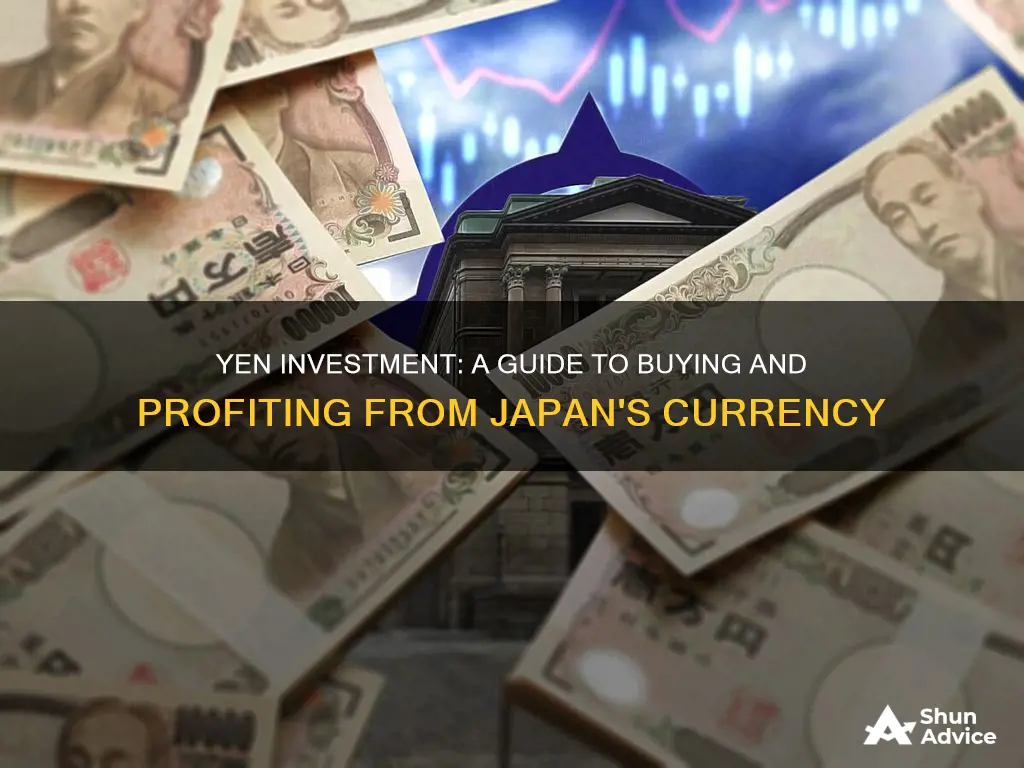
Investing in the Japanese yen can be a good idea for several reasons. Japan has the third-largest economy in the world, and it is also the world's largest creditor, making the yen one of the most important currencies globally. The yen is often considered a safe haven for investors and is the third most traded currency in the forex market.
There are several ways to invest in the Japanese yen. One way is through the forex market, where investors can take positions in the Japanese currency relative to other widely traded currencies such as the US dollar and the euro. Yen futures, traded on the Chicago Mercantile Exchange, also offer a way to speculate on the rise and fall of the yen. Additionally, investors can consider exchange-traded funds (ETFs) that mirror the price of the yen against other currencies. Buying stocks or bonds from Japanese companies is another way to invest in the yen without actually owning the currency.
| Characteristics | Values |
|---|---|
| Type of Investment | Foreign Exchange Trade |
| Currency Borrowed | Yen |
| Currency Used for Investment | US Dollar |
| Investment Type | High-Interest Bonds |
| Profit | 4% a year after settling the debt |
| Benefits | Steady returns, exponential returns if more people make the same trade |
| Popularity | Very popular due to low interest rates in Japan |
| Risk | Big losses if the currency you borrow increases in value |
| Example | Borrowing 6,000,000 Yen to invest in US bonds with a 5% yield |
What You'll Learn

Japanese yen carry trade
A carry trade is a type of foreign exchange trade where you borrow money in a currency with low interest rates and use it to make investments in another currency with high interest rates. In a Japanese yen carry trade, you borrow Japanese yen and then exchange this sum for a different currency with a higher interest rate, such as the US dollar.
For example, imagine you borrow ¥6,000,000 from a Japanese bank at 1% interest per year. You then exchange this sum for $55,000, which you invest in US bonds yielding 5% per year. This means you can make a profit of 4% per year after settling your debt.
Carry trades can generate steady returns and, if enough people make the same trade, returns can increase exponentially due to the laws of supply and demand. Yen carry trades are popular because Japan has maintained extremely low-interest rates since the mid-1990s in an effort to revive the economy after a recession. This means you can borrow money cheaply and leverage your investment to maximise profits.
However, carry trades can also lead to large losses if the currency you borrowed increases in value or the currency you invested in decreases in value. This is because you will earn lower returns and it will cost more to exchange your money back to the original currency to pay off your debt.
The most popular carry trade in the forex markets is exchanging yen for US dollars because the US Federal Reserve has maintained relatively high-interest rates compared to Japan. A yen-US dollar carry trade has the biggest potential for profit.
In 2008, the global financial crisis briefly stopped yen-US dollar carry trades as the US Federal Reserve lowered interest rates to revive the economy. As a result, Japanese yen carry trades shifted to currencies with higher yields, such as the Australian dollar, Brazilian real, and Turkish lira.
Retirement Investing: Navigating the Kiplinger Way
You may want to see also

Foreign exchange (forex)
The foreign exchange market, or forex, is the largest financial market in the world, with over $5 trillion traded daily. The Japanese yen is one of the seven major currencies that make up 80% of this amount.
In the forex market, investors can take positions in the Japanese currency relative to other widely traded currencies such as the US dollar and the euro. Forex contracts are highly leveraged, meaning you need only a small capital investment to trade currency pairs. Long positions anticipate the yen will rise; short positions bet the other way.
The forex markets remain open 24 hours a day throughout the work week, from the Monday opening in Asia until the Friday close in New York.
To get started with forex trading, you can try a practice account with one of the larger online brokers, which do not charge any initial investment, trading commissions, or account fees.
One of the most popular forex trades is the yen-US dollar carry trade. This involves borrowing yen at a low-interest rate and using it to invest in high-interest investments in another currency, such as US bonds. This type of trade can generate steady returns and has the potential for exponential gains if enough people make the same trade. However, it also carries the risk of big losses if the borrowed currency increases in value or the invested currency decreases in value.
Another option for investing in the yen through forex is to use exchange-traded funds (ETFs). ETFs mirror the price of the Japanese yen against other currencies, making it easier for investors to plan their moves. Popular yen ETFs include ProShares UltraShort Yen (YCS) and CurrencyShares Japanese Yen Trust (FXY).
The Ultimate Guide to Investing in Metal Pay: Strategies, Tips, and Tricks
You may want to see also

Exchange-traded funds (ETFs)
The value of the yen is influenced by Japanese interest and inflation rates, as well as the strength of other economies in the Asia-Pacific region, such as China. The yen has historically been considered a safe haven, sought after by investors during times of geopolitical uncertainty.
The Invesco CurrencyShares Japanese Yen Trust (FXY) is the most popular yen ETF, with $279.2 million in assets under management (AUM) as of December 2023. It aims to mirror the price and performance of the yen relative to the US dollar by holding yen on deposit. The fund has an expense ratio of 0.40%.
Other options include the ProShares Ultra Yen ETF (YCL) and the ProShares UltraShort Yen ETF (YCS). These are leveraged ETFs, with YCL providing 2x long exposure and YCS providing 2x inverse exposure to the yen.
When investing in yen ETFs, it is important to monitor major economic data, such as GDP, retail sales, inflation, interest rates, and the country's equity market performance. Additionally, Japan-specific factors like the Tankan survey, published quarterly by the Bank of Japan, can impact the value of the yen and should be considered.
Yen ETFs provide an accessible way to invest in the Japanese currency, offering diversification and exposure to the forex market without the complexity of traditional foreign exchange accounts.
Retirement Redefined: Exploring Non-Retirement Investment Options
You may want to see also

Japanese stocks and bonds
You can buy shares in Japanese companies like Toyota, Mitsubishi, Matsushita, Nissan, and Canon, which are all available for trading on the New York Stock Exchange. As the yen rises against the dollar, Japanese share prices tend to increase. Stock investors also benefit from dividends paid by these companies.
Japanese government bonds are another option, though they offer low interest rates. Their prices reflect the broader economic conditions in Japan, such as trade deficits, GDP growth, interest rates, and inflation.
Exchange-Traded Funds (ETFs) provide a more direct way to invest in the yen. These include the Rydex Currency Shares Japanese Yen Trust (FXY) and the iShares Japan Index (EWJ), which is an ETF that invests directly in the Japanese stock market.
Navigating the Legal Landscape: Paying Finder's Fees for Investment Referrals
You may want to see also

Yen futures
A futures contract allows an investor to speculate on the rise or fall of the yen within a limited period of time. Each contract has an expiration date and a fixed strike price. Investors can also buy and sell options contracts on these futures.
As with forex trading, the futures market is a leveraged play that carries a high degree of risk. You can lose your initial investment and more if your position goes against you. Therefore, a managed futures account, where you place your money with an experienced dealer who carries out the trades, can help limit your risk.
CME Group offers courses for those new to futures, to help them understand the Japanese Yen market and start trading.
Yen as an Investment
The Japanese yen is often regarded as a "safe-haven" currency, providing stability when adverse risk events strike markets. Its price often fluctuates with the macroeconomic landscape, a factor made more complex by the US dollar's role as the global reserve currency.
The Bank of Japan's announcements concerning interest rates, quantitative easing, or direct currency intervention play a large role in the yen's price relative to the US dollar.
As the US's fourth-largest trading partner, a lot of capital flows naturally between the two countries. These flows can create a natural supply and demand for one currency over another.
Other Ways to Invest in the Yen
- Forex: In the foreign exchange market, investors can take positions in the Japanese currency relative to other widely traded monies such as the US dollar and the euro.
- Exchange-Traded Funds (ETFs): Investors can gain exposure to the yen without the need for complicated forex accounts. Examples include the Rydex Currency Shares Japanese Yen Trust (FXY) and the iShares Japan Index (EWJ).
- Japanese stocks and bonds: You can profit indirectly from a yen rise by buying shares in Japanese companies such as Toyota, Mitsubishi, and Nissan, which are available for trading through a broker on the New York Stock Exchange. Japanese government bonds are another option, though they pay quite low rates of interest.
Fear of Losing Money Keeps People from Investing
You may want to see also
Frequently asked questions
Japan has been the 3rd largest economy in the world for many years, and it is also the world's largest creditor, making the Japanese yen one of the most important currencies globally. The yen is considered a safe haven for investors and is the 3rd most traded currency in the forex market.
A carry trade is a type of foreign exchange trade where you borrow money in one currency at a low-interest rate and use it to make high-interest investments in another currency. Japanese Yen carry trades are popular because Japan’s interest rates have been extremely low for a long time, so you can borrow money cheaply and leverage your profits.
Carry trades can lead to significant losses if the currency you borrowed increases in value or the currency you invested in decreases in value. This is because you will earn lower returns and face higher costs when exchanging money to pay off your debt.
There are several ways to invest in the Japanese Yen, including through the forex market, exchange-traded funds (ETFs), buying stocks or bonds of Japanese companies, and trading futures and options contracts.







